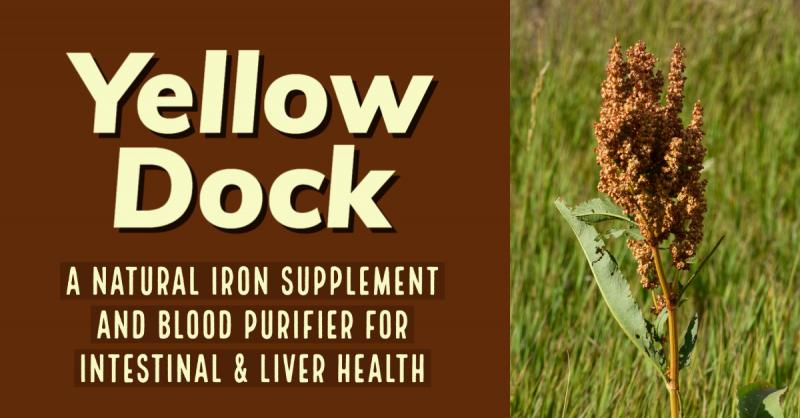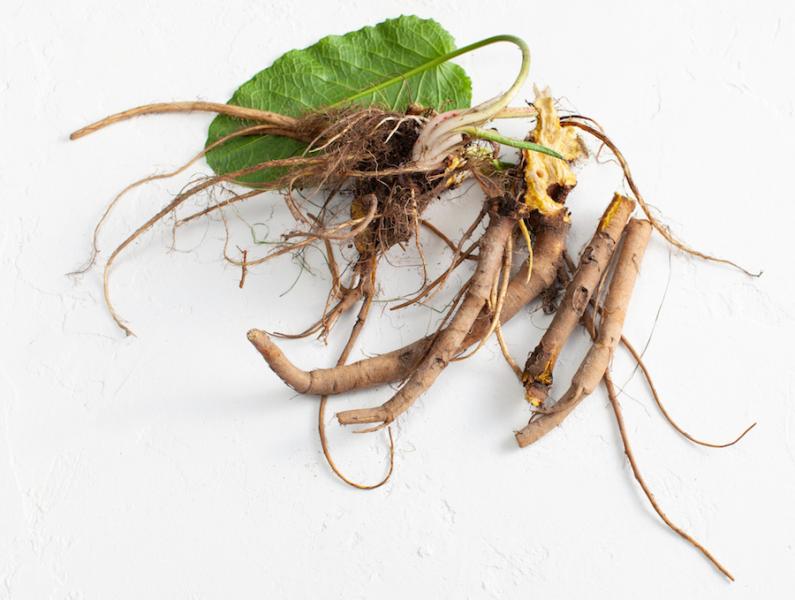
The doctrine of signatures is the idea that the characteristics of a plant give clues as to its uses. This is a very old idea in herbalism, and even if it’s not always reliable, it can be very helpful in associating plants with their uses. Yellow dock is a good example of the doctrine of signatures. As the plant dries out in the fall it turns a rusty color, which associates it with iron. In Advanced Treatise in Herbology, Edward Shook says that all the docks (Rumex sp.), not just yellow dock (R. crispus) are iron-rich plants.
I don’t know where I first learned about using yellow dock as an iron supplement, but I do remember the first time I tried it. A woman in her 7th month of pregnancy was anemic. She was taking a 25 mg iron supplement and her iron levels were still falling. Based on a protocol a midwife had given me, I suggested she take 12 alfalfa tablets or capsules and 4 capsules of yellow dock daily. When she started taking these herbs her iron levels rapidly returned to normal levels. I’ve seen similar results every time I’ve tried it. And I've also had similar experiences using yellow dock with stinging nettle leaf.
Why Does It Work?
When Mark Pederson completed the research for Nutritional Herbology, he found that there was an average of 7.6 mg of iron in 100 grams of yellow dock, which is a high iron content for an herb. However, an average capsule yellow dock is about 0.5 grams. So, it would take about 200 capsules to get more than 7 mg of iron. To put this in perspective, the RDAs for iron are 10 mg for adult men and post-menopausal women and 15 mg for adult women during childbearing years.
The four capsules of yellow dock I have recommended for anemic women contain only about 0.15 mg of iron. The alfalfa contains even less (2.6 mg per 100 grams), which translates to about 0.15 mg in the 12 capsules. Thus, the total iron ingested using this protocol is around 0.3 mg per day. This presents an interesting question, how can iron levels fail to improve on a 25 mg iron supplement and improve on an 0.3 mg iron supplementation using herbs?
Holism and Synergy
 To answer this question, let’s start with the realization that most iron supplements are very poorly absorbed, and they irritate the gut as well. Mark Pederson once told me that a 3 mg iron amino acid chelate absorbed more efficiently than 25 mg of ferrous fumarate. It’s also easier to obtain iron from foods, with the heme iron found in red meat being one of the most easily absorbed forms. It’s likely that the iron in herbs absorbs more efficiently, but that’s still not enough to explain what’s happening.
To answer this question, let’s start with the realization that most iron supplements are very poorly absorbed, and they irritate the gut as well. Mark Pederson once told me that a 3 mg iron amino acid chelate absorbed more efficiently than 25 mg of ferrous fumarate. It’s also easier to obtain iron from foods, with the heme iron found in red meat being one of the most easily absorbed forms. It’s likely that the iron in herbs absorbs more efficiently, but that’s still not enough to explain what’s happening.
Another factor is that iron doesn’t act by itself. There are many nutritional co-factors needed to properly absorb and utilize iron—vitamin C and copper for example. Along with iron, yellow dock contains vitamin C and may have other phytochemicals that aid iron absorption and utilization. But, perhaps more importantly, yellow dock influences gastrointestinal and liver health helping the body to more efficiently absorb and utilize iron, and perhaps other nutrients as well.
Whatever the underlying mechanism, seeing how using a different form of supplementation can drastically impact the results demonstrates the importance of taking a holistic view of herbs and health. We can't depend on the reductionistic approach of Western science where herbs are only seen as quantities of various phytochemicals. Herbs are synergistic and work holistically.
Yellow Dock and Gut Health
The health of the gastrointestinal tract has a big impact on overall health, and one of yellow dock’s best uses is in promoting intestinal health. It contains both tannins, which tone up weak tissue, and anthraquinones, which stimulate elimination. The astringent action is more powerful than the laxative action, which only occurs in very large doses. Still, one can think of yellow dock as having a balancing action on the colon, helping to normalize bowel function, especially in cases where diarrhea may be accompanied by slow digestion and sluggish peristalsis.
Matthew Wood gives a very specific description of the tongue pattern where yellow dock is indicated. He says that the tongue is red, elongated, and pointed, all of which indicate inflammation or heat in the body. It also has patches of white on the back or other places in the mouth, which indicate a congested condition. Thus, yellow dock is indicated where the bowels are congested and irritated. It’s very likely that when the gut is in this condition it is very hard to absorb iron and other minerals the body needs.
Alterative or Blood Purifier
 Even though I’ve used yellow dock with alfalfa or nettles for anemia, I’ve primarily seen yellow dock as an alterative or blood purifier. We don’t fully understand how this class of herbs works, but we know that they are used to clear up congested or morbid conditions in the body, such as irritated skin (e.g. rashes, eczema, acne), congested lymphatics, sluggish liver, and gallbladder function, and otherwise help the body to clean itself out.
Even though I’ve used yellow dock with alfalfa or nettles for anemia, I’ve primarily seen yellow dock as an alterative or blood purifier. We don’t fully understand how this class of herbs works, but we know that they are used to clear up congested or morbid conditions in the body, such as irritated skin (e.g. rashes, eczema, acne), congested lymphatics, sluggish liver, and gallbladder function, and otherwise help the body to clean itself out.
Yellow dock fits this category. It has been traditionally used to clear up red, irritated conditions of the skin, congestion of the liver and gallbladder, and a congested, irritated intestinal tract. It is this arena where it seems to exhibit its most powerful action. Since gut health is important for iron absorption and the liver plays an important role in the utilization of iron in making hemoglobin, this is probably why yellow dock may aid iron utilization.
I seldom use alteratives as single herbs. Usually, I use them in formulas. Yellow dock combines will with herbs like dandelion, burdock, Oregon grape, and sarsaparilla in formulas to clear up skin conditions, improve liver and gallbladder functions, and help to promote a healthy colon and digestive tract.
Alterative herbs have also been used to help people with cancer. Yellow dock and its close relative sheep sorrel (R. acetosella) both contain oxalic acid, which in its natural form appears to have anticancerous properties. Sheep sorrel is an ingredient in Essiac, a famous anti-cancer formula. And I'd bet that young yellow dock leaves could be used as a substitute for sheep sorrel in Essiac. And, like sheep sorrel, the young yellow dock leaves can be cooked and eaten as a vegetable. However, if you are prone to kidney stones I don’t recommend consuming herbs with oxalic acid as it can increase the risk of kidney stones.
Truthfully, I don't have a definitive explanation for how yellow dock helps to overcome anemia. And while knowing can help me explain herbs better to others, I don’t need to know why an herb does what it does to use it effectively. All I care about is knowing when and how to use it to get consistent, effective results. So whether you’re trying to heal the gut, cleanse the body, or overcome anemia, you will find yellow dock a dependable herbal ally.
Downloads
Steven's Articles
-

-
Eucommia Bark
A superior tonic that promotes kidney, structural,…
January
-

-
Goldenthread, Phellodendron, and Yellow Root
Three herbal remedies containing the infection-fighting…
-

-
Teasel
A traditional herb for healing bones and joints…
-

-
Barberry and Healthy Personal Boundaries
A thorny shrub for fighting infections and supporting…
December
-

-
The Evidence for Berberine
A yellow alkaloid found in traditional infection-fighting…
-

-
The Sensible Use of Caffeinated Herbs
Kola nuts, guarana, and yerba mate and other herbs…
-

-
The Health Benefits and Problems with Coffee
This popular caffeinated beverage can be beneficial…
October
-

-
Understanding Caffeine & Cellular Adaptation
Preserving the power of caffeine's buzz and the…
September
-

-
Horseradish
A pungent spice for aiding protein metabolism…
-

-
Banaba or Crepe Myrtle
A beautiful tree from Southeast Asia whose leaves…
August
-

-
Monkeyflowers
Flower essences to help see ourselves more clearly…
-

-
Mariposa Lilies
Strengthening the bond between mother and child…
-

-
The Noble Bay Leaf
A common kitchen herb for aiding digestion and…
-

-
Epimedium: Horny Goat Weed
A circulatory stimulant and kidney yang tonic…
July
-

-
The Medicinal and Nutritional Benefits of Apricots
A nutritious fruit and valuable medicinal seed for coughs

